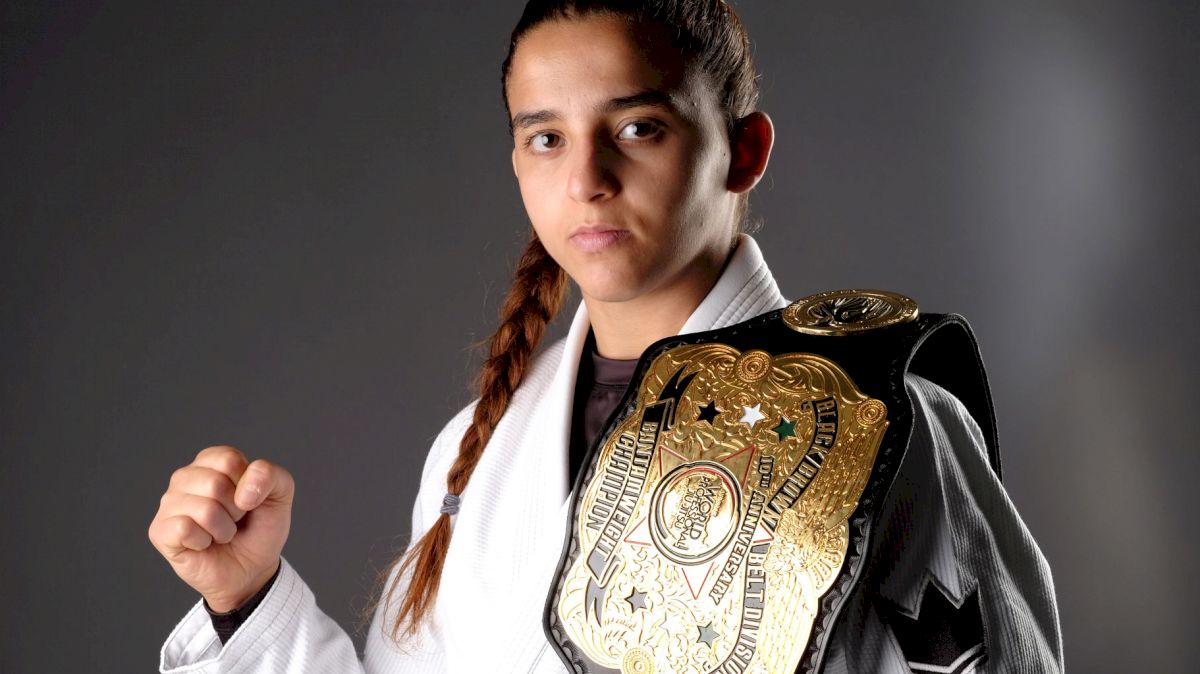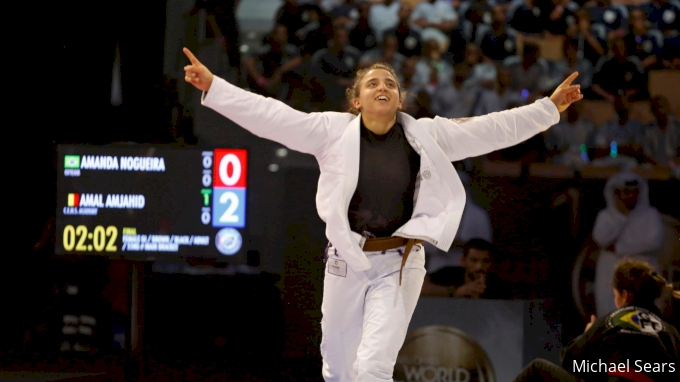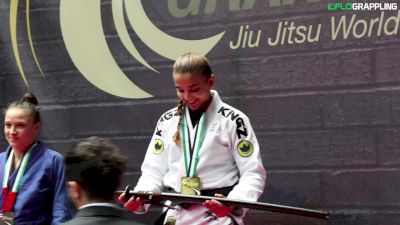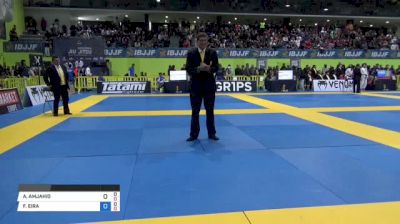Belgium's Amal Amjahid and Her Quest For Global Jiu-Jitsu Recognition
Belgium's Amal Amjahid and Her Quest For Global Jiu-Jitsu Recognition
23-year-old Amal Amjahid of C.E.N.S. Academy in Belgium is no doubt one of the most promising black belt prospects of 2018.

23-year-old Amal Amjahid of C.E.N.S. Academy in Belgium is no doubt one of the most promising black belt prospects of 2018.
A two-time double gold winner (weight division and absolute) as a brown belt at the IBJJF European Championships, Amal’s dream of becoming an IBJJF World Champion was impeded when visa problems prevented her father and coach Khalid Houry from entering the USA.
Since being promoted to black belt, Amal is poised to take on the best female grapplers in the world in 2019. Already a veteran of the UAEJJF scene (where brown and black belt women compete in the same brackets) she is no stranger to the elite opposition at her weight: Amal holds an even 2-2 record against 2018 black belt light-featherweight World champ Amanda Monteiro, including a dominant submission victory at their last meeting in the Abu Dhabi World Pro final.

2018 was a big year for European jiu-jitsu, in which rookie Norwegian black belts Tommy Langaker and Espen Mathiesen finished second and third respectively at the IBJJF World Championships, and Mathiesen winning gold at the Abu Dhabi World Pro.
Amjahid should contend for any major title at her weight in her initial black belt campaign. Up first is the 2018 Abu Dhabi Grand Slam Rio de Janeiro on November 16-18, where an imminent fifth meeting with Monteiro seems destined to take place.
We caught up with the soft-spoken Belgian to find out more about her life and career, and how her journey has brought her to this point.
Where are you from, and how would you describe it?
I’m from Brussels. Brussels is a very discreet city but also very powerful because Brussels hosts the largest institutions in Europe, such as the European Parliament. It is here that the biggest European decisions are made. Brussels is also the center of European culture and famous for chocolate and beer.
What is the jiu-jitsu scene like in Belgium?
Certainly the number of practitioners in Belgium is not equal to that of Brazil or the United States but it is constantly increasing in recent years. Today it is impossible to quantify the exact number of practitioners in Belgium, this is due to the fact that a significant number of club and practitioners are not affiliated to any national sports federation. But there are indicators that can measure the growth in the number of practitioners, such as the increase in club openings, the number of participants in national championships, as well as the increase in jiu jitsu clubs for children that ensure a secure future in the continuity for the competitions.
How did you start training jiu-jitsu? What age were you?
I started jiu-jitsu at the age of 7. At school I was the smallest in class. Classmates laughed at me and I defended myself all the time. I was fighting a lot during the breaks, so the teachers advised my mother to register me in a martial arts school. I tried several sports: karate, judo, taekwondo, boxing. But there were only boys bigger and stronger than me. One day we saw an advert for jiu-jitsu, when I tried it I immediately liked it.
Do you remember your first tournament?
Two months after registering for jiu-jitsu I started competing. I was a white belt and I was seven years old. During the championship I was fighting in two categories, I entered the female categories and then I entered the boy’s categories, I won them both. I always did 8-9 fights per championship. I liked the challenges, that's why I always fight in the openweight division.
When did you fall in love with jiu-jitsu?
I fell in love with this sport at the first training session. I had tried several sports but there were only boys bigger and stronger than me. It was exactly what I was looking for: a martial art in which I am able to face the strongest despite my small size.
You do a lot of work with an organization called ADEPS, can you explain that a little?
ADEPS supports athletes in Belgium by granting them various help, such as free access to infrastructure, financial benefits, access to sports performance support services (physiotherapist, doctor, dietitian, etc.).. ADEPS also helps to support athletes as part of their "life project" or "double career": sports and education by authorizing school facilities, a justified absentee rate, etc.
What do you like most about competition?
It's the challenges that motivate me to train. I like to surpass myself, to exceed my limits and I do this by facing the best athletes in the world. I need to develop and to prove to myself that I am stronger each day.
Now that you are a black belt, what are you expecting the competition to be like?
I know that the fights will not be easy, that each competitor is dangerous and that the road to victory will be exhausting but I like to fight. The higher the level of my opponent is, the more I enjoy the fight. For me it is not the adversary who counts but the way she expresses herself in the fight forcing me to have to surpass myself and creating a challenge for me.
What are your goals for 2019?
I hope to rise to the highest rank of female jiu-jitsu in the world. Winning the IBJJF European Championships, the IBJJF World Championship and all the Abu Dhabi Grand Slams are part of my goals for the coming year.

What do you like about the UAEJJF competitions ?
In my own opinion, the UAEJJF responds to the needs and reality of what Jiu-Jitsu practitioners represent in the world. I have a lot of respect for this association as it allows practitioners from across the globe and from different social and economic backgrounds to participate in tournaments– if they have talent of course– by providing them with travel advantages or financial support, which makes it easier for us to reduce the financial cost of our participation in their events.
It also gives visibility for the athletes who perform and compete in their championship. The media coverage of their events is wide enough to create visibility and therefore be spotted by potential sponsors who are necessary for most of top athletes to sustain.
The UAEJJF raises the level of professionalism of our sport at an international level by making it more attractive thanks to the organization of quality events by professionals. It is currently the only real force capable of influencing the Olympic authorities toward a possible recognition of our art as an Olympic discipline. I am not trying to idealize it, there is still room for improvement, but we can only notice the tremendous job they have accomplished for our international community in only a few years.
Are you going to pursue the end of season top female ranking in the UAEJJF?
Yes, I would like to participate in the Grand Slam Rio, Abu Dhabi and London unfortunately I couldn't participate at the Los Angeles Grand Slam because of my father’s visa problem.
Watch the Abu Dhabi Grand Slam Rio de Janeiro LIVE or On Demand on FloGrappling.
